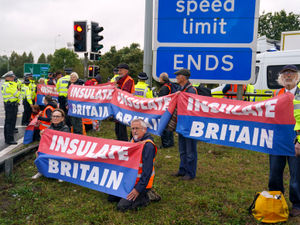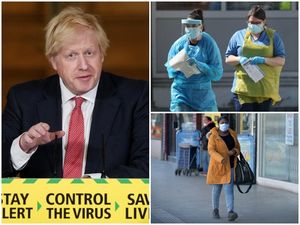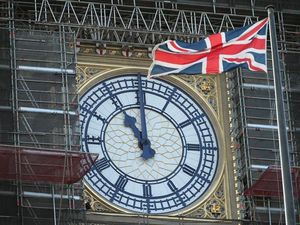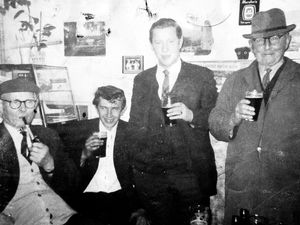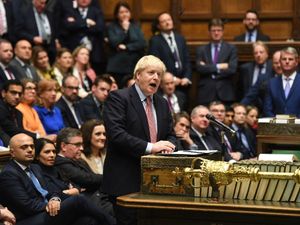Rise of the Mercians - MPs want counties to team up in new powerhouse
From the ancient powerhouse of the Anglo Saxons to the new rural powerhouse of the Midlands - Mercia is coming back.
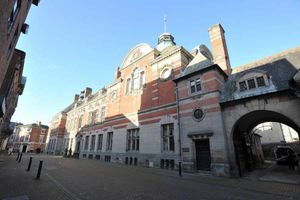
MPs want Staffordshire, Shropshire, Derbyshire and Nottinghamshire to team up and bid for devolved powers from Whitehall, sharing the benefits of funding, new jobs, improved skills and transport.
The proposed Mercian economic partnership would be set up as a rival to the West Midlands Combined Authority, through which Wolverhampton, Sandwell, Dudley, Walsall, Coventry and Solihull will team up.
If MPs in Staffordshire get their way, the county will join forces with Derbyshire and Nottinghamshire, as well as Shropshire, in their own economic powerhouse.
It would effectively be along the footprint of the northern part of one of the most powerful kingdoms of Anglo-Saxon England.
The Mercians were so called in old English as the 'people of the marches'.
According to the Encyclopaedia Britannica, they held a position of dominance for much of the mid seventh to early ninth centuries.
Mercia's first king, that anyone knows anything of, was Penda, who died in 655 AD.
His sons were Wulfhere, who coverted from paganism to Christianity, and Aetherlred, who invaded Kent. And under Aethelbald, ruler from 716 to 757, Mercia took control of London and was described as ruling almost all of England south of the river Humber. Aelthalbald was killed by his own bodyguards and replaced briefly by Beornred. Within a year, Offa, the grandson of Aethalbald's cousin Eanwulf had taken the throne and Mercia went into its most influential period.
It was the invasions of the Vikings that eventually toppled the great Mercians, their final king Ceolwulf II dying in 879.
Now, far from conquest, the proposal by MPs is to use the Merican area to team up and get hold of powers offered willingly by Chancellor George Osborne under his devolution deals.
The Black Country is already working with Birmingham, Coventry and Solihull but MPs Gavin Williamson and Jeremy Lefroy see the issues in these rural counties as very different to the urban areas of the West Midlands metropolitan boroughs.
The idea is being put forward by South Staffordshire MP Gavin Williamson, Stafford MP Jeremy Lefroy and Staffordshire Moorlands MP Karen Brady.
"What we're proposing is a Mercian economic partnership, across the county areas to share the benefits of bringing decision making to a local level," Mr Williamson said.
"Staffordshire is not inner city Birmingham. We don't want to be subsumed into a Greater Birmingham."
The three MPs have been in discussions with Staffordshire County Council leader Philip Atkins and the local government secretary Greg Clark.
Mr Lefroy said: "I'm pushing for Staffordshire to get together with Shropshire, Derbyshire and Nottinghamshire in a large Mercian partnership.
"We see no problem in the decisions of authorities like Cannock Chase, Tamworth and Telford and Wrekin to join the West Midlands Combined Authority. It makes sense because of their proximity to Birmingham or the Black Country.
"They could all have a foot in both camps."
Cannock Chase, Tamworth and Telford and Wrekin are all going to be 'non-constituent' members of the West Midlands Combined Authority.
That will mean they have a vote and will work together with Birmingham, Wolverhampton, Walsall, Sandwell, Dudley, Coventry and Solihull on issues that go across borders, including regeneration, skills and transport.
But the smaller districts will not be part of the big 'devolution deal', seeking powers and funding from the central government to be controlled by a directly elected 'metro' mayor.
A leaked copy of the bid includes a request for funding to make the M6 Toll free to use in order to cut congestion on the motorways and avoid the need for potentially more costly road building or improvements.
The West Midlands Combined Authority has been given its name as a way of ending the long-running debate over whether the Black Country would become part of 'Greater Birmingham'.
The Greater Birmingham name was vetoed by Black Country council leaders because the authority would contain three cities - Birmingham, Wolverhampton and Coventry - as well as metropolitan boroughs with their own distinct identities.

